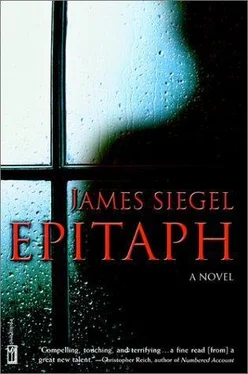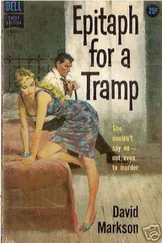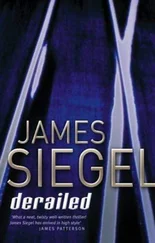James Siegel - Epitaph
Здесь есть возможность читать онлайн «James Siegel - Epitaph» весь текст электронной книги совершенно бесплатно (целиком полную версию без сокращений). В некоторых случаях можно слушать аудио, скачать через торрент в формате fb2 и присутствует краткое содержание. Жанр: Триллер, на английском языке. Описание произведения, (предисловие) а так же отзывы посетителей доступны на портале библиотеки ЛибКат.
- Название:Epitaph
- Автор:
- Жанр:
- Год:неизвестен
- ISBN:нет данных
- Рейтинг книги:4 / 5. Голосов: 1
-
Избранное:Добавить в избранное
- Отзывы:
-
Ваша оценка:
- 80
- 1
- 2
- 3
- 4
- 5
Epitaph: краткое содержание, описание и аннотация
Предлагаем к чтению аннотацию, описание, краткое содержание или предисловие (зависит от того, что написал сам автор книги «Epitaph»). Если вы не нашли необходимую информацию о книге — напишите в комментариях, мы постараемся отыскать её.
Epitaph — читать онлайн бесплатно полную книгу (весь текст) целиком
Ниже представлен текст книги, разбитый по страницам. Система сохранения места последней прочитанной страницы, позволяет с удобством читать онлайн бесплатно книгу «Epitaph», без необходимости каждый раз заново искать на чём Вы остановились. Поставьте закладку, и сможете в любой момент перейти на страницу, на которой закончили чтение.
Интервал:
Закладка:
They don't hate Jews in Argentina? They don't want to kill them?
No. They're friendly in Argentina.
No Nazis, Gushenow repeated, like a prayer, like a prayer he thought God might actually be listening to.
No, Marcel said, no Nazis, withdrawing the needle and wiping Gushenow's buttock with a swab.
Just coconuts.
Once upon a time there was a fire at 21 Rue la Soeur.
The smoke began billowing out of the house around daybreak, a thick, black, nauseating smoke that caused almost every resident on Rue la Soeur to batten down their windows, as if a violent storm was just minutes away.
In a sense, it was.
It was spring. Spring 1944, the kind of Parisian day songwriters liked to write about, the kind of day that sent people out into the Bois de Boulogne to feed the elephants and stare at the painted-on nylons. The kind of spring that renewed faith. For even though the Germans had begun their fifth year of occupation much the same as they began their fourth-it was common knowledge the tide had turned.
But on Rue la Soeur, the windows were shut tight, and the black smoke that had been coming out of 21 since morning kept coming and coming and hanging there up around the rooftops like a rain cloud come to earth.
Someone on the block, someone who could no longer stand an odor that was not exactly wood and not exactly coal and not exactly oil and not exactly anything they'd ever smelled before-finally called the police.
They arrived in minutes, faster than they would've responded to a murder, to a beating, or to a simple scream in the night. Gestapo headquarters, after all, was right down the block, and the German military police building and the office of the French Gestapo were more or less in the neighborhood. Screams could get policemen in trouble. Fires were safer.
There was a problem however.
They couldn't get in.
And the smoke became worse, drifting over them like a cloud of stinging locusts, leaving them teary-eyed and half blind. Not able to push in the door, and unwilling to smash a window-you never knew which German official owned which house-they called the fire department, which arrived within five minutes, launched a ladder up to the second-floor window, and broke in.
The shattered glass reopened several windows on the block. The crowd of police and firemen and fire trucks and passing dog walkers and gaping soldiers began to draw the residents out into the street. They held handkerchiefs of all colors up to their mouths, but within seconds each was black as widow's weeds.
Two of the firemen entered the upstairs window and began to warily make their way down. Down and down and down-following the odor like nervous bloodhounds.
It led them all the way to the furnace room, to the very bottom of the house, where two cast-iron furnaces were at full burn. And down there was Hades, like the one described in books: hot and red and searing and the odor, that peculiar odor, thick as steam.
One of the firemen used a metal stoker to pry the furnace door open. The blast of heat hit him full force: a wrenching, overpowering, blistering heat that almost toppled him like the aftershock of a bomb. But he didn't feel it, not really, couldn't feel what came out of the furnace, because he was thinking of what he saw in the furnace instead.
What he saw: a skull, two leg bones, several arms, one of which, detached from the elbow, was twisting in the flames as if waving at him. It was the wave he kept seeing, as if someone was welcoming him to hell.
The fireman threw up.
His partner, flashlight in hand, walked over to see what kind of mess he'd made. But he found a different sort of mess than the one he was expecting. It reminded him- he said this later, to the local magistrate, the chief of police, the two Gestapo officials, the three newspapers-of a butcher shop at the end of the day, reminded him of that because maybe that's what he was hoping, desperately hoping, it would turn out to be. It was a butcher shop of sorts, but just of sorts. It was littered with humans, with pieces of them, scattered about as if waiting to be wrapped, then priced for sale. In the basement were several torsos, some sawed-off legs stacked against the wall, four or five arms piled like firewood, and three human heads. Like mannequins before they're put together, he thought now, like that, his mind leaping to another allusion in a mad dash to get out. But there was no place to go. There were the bodies, raw and naked, and there was his partner kneeling beside them, making the sign of the cross, over and over, as if he were baptizing himself in a river of blood. it it it
After they cleaned out the furnace, after they accounted for every bone on the floor, after they dredged up every skeleton from the lime pit they discovered in the courtyard, after they added up all the bodies and pieces of bodies they found in the sewers under the house, after they tagged and catalogued every piece of furniture, every fur, every bracelet and necklace and ring and hat pin they found scattered throughout the four floors of the house, after they interviewed and interrogated and investigated, they came up with this figure:
Two hundred and fifteen men, women, and children.
Some found this figure too low. Some found it too high.
They never found Marcel.
TWENTY-FOUR
The ice cream truck had long ago departed, and one by one the people were drifting back, their giddy voices floating in through the closed windows like the laughter of ghosts. And why not. The room, after all, was filled with them. With ghosts. With some of the two hundred and fifteen maybe, with some of them. "So," Dr. Morten said, "now you know." "Know?" William said, playing dumb, playing it with the desperate intensity of a poker player who's lost every chip but one. Call this chip hope, faith, or just wishful thinking; call it gone too. "Know what?" "William…" Dr. Morten said, in the tone doctors use when they need to deliver a terminal diagnosis, but haven't the heart to do it. "The thing is, I'm not following…" "No…?" Dr. Morten said.
"No."
"Let me clear it up for you then. Petoit's escape route lasted almost four years. At first, he handled all of it himself. Then like all successful entrepreneurs, he expanded his workforce. You understand. It wasn't easy killing all those people-he needed help. First a Croatian abortionist called Lazlo-an addict Petoit kept in dope. First him. Then he needed recruiters."
You understand.
Not yet. Not if Mr. Stupid had anything to say about it. Not if he closed his eyes tight enough, put his hands over his ears, and hummed something cheery. See? Understand what? He didn't understand at all. He didn't understand Petoits, he didn't understand monsters, he didn't understand the night Jean said this needs your knowledge, William and sent him packing to the Par Central Motel either. Even then he didn't understand. When it came to not understanding, he was a pro's pro. So he could continue to not understand about Jean, about where the tortured concentration camp survivor with the heroic resume had suddenly gone to. Where was he…?
"Recruiters. Four or five of them," Dr. Morten continued. "They'd go out into the streets looking for people whose lives were hanging by a string. Mostly Jews, of course. A few black marketeers, a collaborator or two. But mostly Jews. People who had to get away. Who'd do anything to get away. To Argentina, the recruiters said. The promised land."
And now, of course, even he was getting it. You can only play dumb so long, even when you are dumb; sooner or later the bad news will come seeping in like early morning chill, leaving you numb and freezing certain pictures in your brain. This was his picture: Jean, carefully placing that tattered photograph back into his pocket while he rolled up his sleeve to the elbow just daring you to look away.
Читать дальшеИнтервал:
Закладка:
Похожие книги на «Epitaph»
Представляем Вашему вниманию похожие книги на «Epitaph» списком для выбора. Мы отобрали схожую по названию и смыслу литературу в надежде предоставить читателям больше вариантов отыскать новые, интересные, ещё непрочитанные произведения.
Обсуждение, отзывы о книге «Epitaph» и просто собственные мнения читателей. Оставьте ваши комментарии, напишите, что Вы думаете о произведении, его смысле или главных героях. Укажите что конкретно понравилось, а что нет, и почему Вы так считаете.












